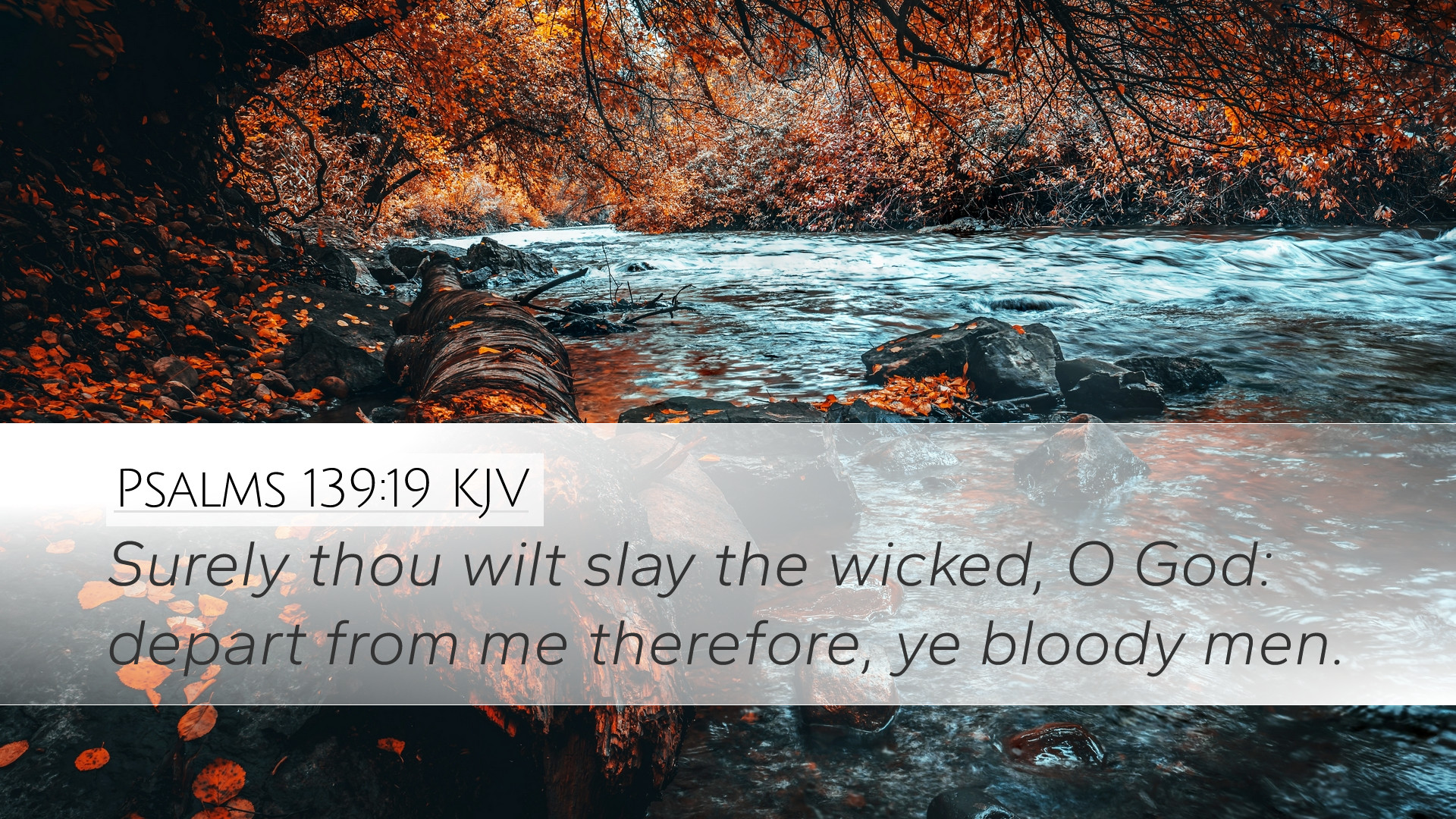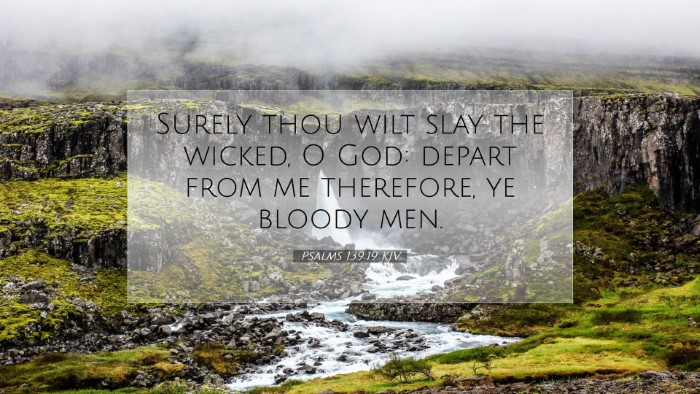Psalms 139:19 - Commentary
Verse: "Surely thou wilt slay the wicked, O God: depart from me therefore, ye bloody men."
Introduction
This verse from Psalms 139 is a poignant declaration of the psalmist's profound awareness of God's nature as just and righteous. The psalmist expresses a deep emotional response to the presence of evildoers and their potential threats. Several public domain commentaries provide insights into the theological and practical implications of this verse for believers, particularly for pastors, theologians, and students of the Bible.
Contextual Analysis
This verse appears in a psalm that celebrates God's omniscience and omnipresence. The psalmist, traditionally ascribed to David, has just reflected on the intimate knowledge that God has of every individual. As the psalm transitions to verses that express indignation towards the wicked, it illustrates the dual themes of God's love for the righteous and His justice against sin.
Matthew Henry's Commentary
Matthew Henry emphasizes the certainty of God's judgment against the wicked. He notes that the psalmist acknowledges God's sovereignty and righteousness in slaying the wicked. Henry highlights that the psalmist's request to "depart from me" reflects both a yearning for separation from sin and a recognition that the presence of evil men can lead to spiritual compromise. He explains:
"The souls of the righteous are uneasy among the wicked; they desire to be delivered from them and from their delusions."
Further, Henry discusses the intensity of the emotions expressed. The psalmist, feeling surrounded by corruption, seeks God’s protection and pleads for divine intervention against "bloody men." This indicates a profound disdain for violence and evil, aligning with the theme of holiness found throughout the Psalms.
Albert Barnes' Insights
Albert Barnes provides a detailed exposition on the nature of the 'wicked' mentioned in this verse. He notes that these are often those who are violent and oppressively evil. Barnes states:
"Wicked men are described as bloody, either because they are guilty of the shedding of innocent blood or because they are malicious and deceitful."
Barnes observes that the psalmist's prayer for God to slay the wicked demonstrates an alignment with God’s justice, understanding that God is the ultimate executor of judgment. He asserts that this call for divine action against the wicked serves as a reminder to believers of God’s righteousness in contrast to human sinfulness.
Adam Clarke's Perspective
Adam Clarke offers a theological reflection on the implications of God’s judgment on the wicked. He insists that the request for God to "slay the wicked" is not merely a plea for vengeance but reflects a desire for justice and the vindication of righteousness. Clarke asserts:
"It is the longing of the righteous to see justice served and for the moral order to be restored."
Clarke further explores the psyche of the psalmist, who experiences anguish at the thought of being associated with those who oppose God. He highlights that the call for separation from the wicked reveals an understanding of the impact sinful behavior can have on one's spiritual life and community.
Theological Significance
The broader theological significance of Psalms 139:19 rests in its depiction of the character of God as both loving and just. The psalmist’s lamentation showcases an essential aspect of the faith journey: the struggle between the desire for divine justice and the presence of evil in the world. Pastors and theologians can draw from this verse to teach about the holistic nature of God’s character—how mercy and justice coexist within divine governance.
Pastoral Application
For pastors, Psalms 139:19 serves as an opportunity to address congregational concerns regarding evil and suffering. This verse can be used to encourage believers to seek comfort in God's just nature while also urging them to reflect on their lives and associations with those who oppose God’s will. Emphasizing the importance of living in holiness and keeping away from 'bloody men' is vital in pastoral care, helping congregants to navigate relationships that may lead them away from God.
Conclusion
Psalms 139:19 communicates profound truths about the nature of God and the human condition. As the psalmist recognizes the dangers posed by wicked individuals, it offers a poignant reminder for believers to remain vigilant in their faith and relationship with God. Through the insights of Matthew Henry, Albert Barnes, and Adam Clarke, we discern a deep theological and pastoral richness that invites ongoing reflection, study, and application in the life of the church.


